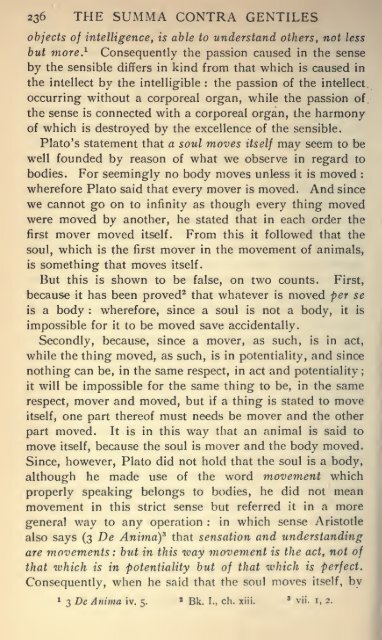summa-contra-gentiles
Summa
Summa
You also want an ePaper? Increase the reach of your titles
YUMPU automatically turns print PDFs into web optimized ePapers that Google loves.
236 THE SUMMA CONTRA GENTILES<br />
objects of intelligence, is able to understand others, not less<br />
but more.^ Consequently the passion caused in the sense<br />
by the sensible differs in kind from that which is caused in<br />
the intellect by the intelligible the passion of the intellect<br />
:<br />
occurring without a corporeal organ, while the passion of<br />
the sense is connected with a corporeal organ, the harmony<br />
of which is destroyed by the excellence of the sensible.<br />
Plato's statement that a soul moves itself may seem to be<br />
well founded by reason of what we observe in regard to<br />
bodies. For seemingly no body moves unless it is moved :<br />
wherefore Plato said that every mover is moved. And since<br />
we cannot go on to infinity as though every thing moved<br />
were moved by another, he stated that in each order the<br />
first mover moved itself. From this it followed that the<br />
soul, which is the first mover in the movement of animals,<br />
is<br />
something that moves itself.<br />
But this is shown to be false, on two counts. First,<br />
because it has been proved^ that whatever is moved per se<br />
is a body : wherefore, since a soul is not a body,<br />
impossible for it to be moved save accidentally.<br />
it is<br />
Secondly, because, since a mover, as such, is in act,<br />
while the thing moved, as such, is in potentiality, and since<br />
nothing can be, in the same respect, in act and potentiality ;<br />
it will be impossible for the same thing to be, in the same<br />
respect, mover and moved, but if a thing<br />
is stated to move<br />
one part thereof must needs be mover and the other<br />
itself,<br />
part moved. It is in this way that an animal is said to<br />
move itself, because the soul is mover and the body moved.<br />
Since, however, Plato did not hold that the soul is a body,<br />
although he made use of the word movement which<br />
properly speaking belongs to bodies, he did not mean<br />
movement in this strict sense but referred it in a more<br />
general way to any operation also says (3 De AnimaY that sensation and understanding<br />
are movements : but in this way movement is the act, not of<br />
: in which sense Aristotle<br />
that which is in potentiality but of that which is perfect.<br />
Consequently, when he said that the soul moves itself, by<br />
^ S De Anima iv. 5. * Bk. I., ch. xiii.<br />
' vii. i, 2.


















